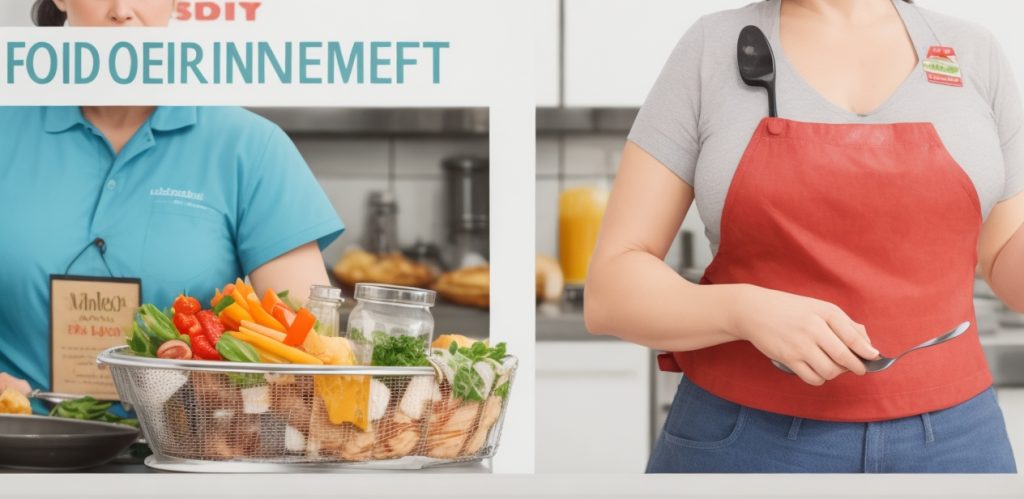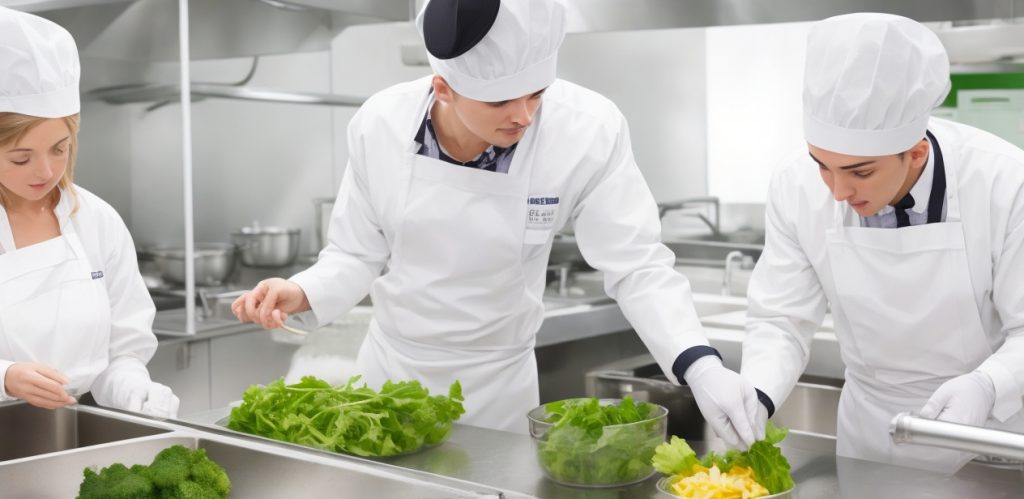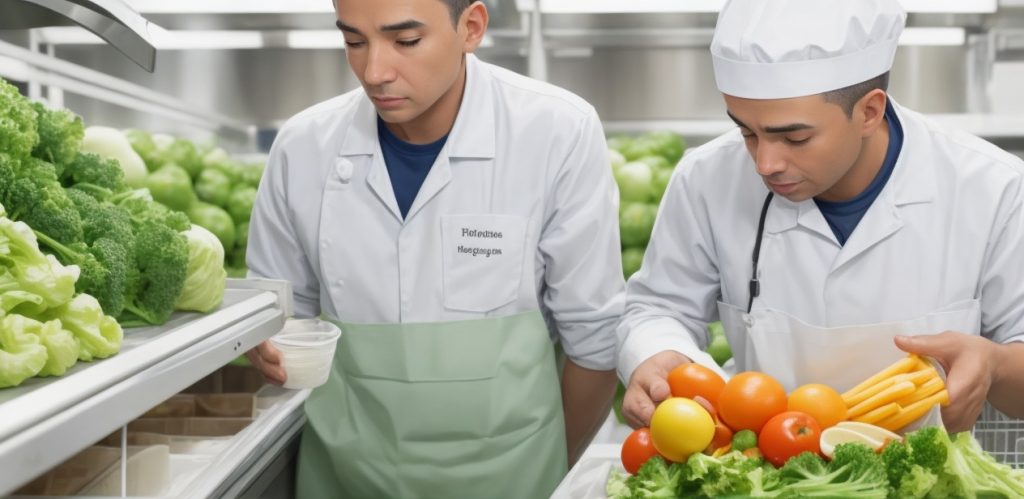As an Amazon Associate, I earn from qualifying purchases

In spite of the fact that there are numerous similitudes between the food handler vs food manager accreditation, there are differentiations to be made. It is contingent upon your job and obligations you can or are expected to finish.
The Food Handler Endorsement covers and checks essential food handling information at the representative level. Conversely, that’s what the Chief Confirmation checks “A supervisor or individual in control has adequate food handling information to safeguard people in general from food-borne sickness”.
For the most part, the Food Overseer certificate test is more limited, with around 40 various decision questions. The Food Manager Certificate test generally has a sum of 90 various decision questions. Both food administrators and overseers should score somewhere around 75% to pass and accept their affirmation, for accreditations like ServSafe.
Understanding Food Handlers
Think of food handlers as the awesome folks in restaurants and places where they make and serve food. They wear many hats – they’re the ones cooking, serving, and even tidying up the kitchen.
In the bustling world of food, a food handler can be anyone from the chefs whipping up delicious dishes to the friendly servers bringing your food to the table. They’re the heartbeat of food service.
In New York City, they’ve got a special definition for food handlers. According to the city’s health code, a food handler is basically anyone working in a restaurant or a place where they prepare food, but it’s not a retail store. So, you won’t find them in your local grocery store, but they’re everywhere else food is made and served.
Their job? Well, it’s a mix of things. They’re the ones cooking up your favorite meals, serving them with a smile, and making sure everything’s clean and tidy in the kitchen. Think of them as the unsung heroes behind your dining experience. They make sure the food is not just delicious but safe to eat too!
So, the next time you enjoy a meal out, give a nod of appreciation to these kitchen superheroes!
Food Hygiene Training

Another vital aspect of food handler training is food hygiene. This involves the following key areas:
- Basic Personal Hygiene: Food handlers are trained in essential personal hygiene practices, including proper handwashing, the use of appropriate uniforms, and the use of hair coverings to prevent contamination.
- Workspace and Equipment Cleaning: Proper cleaning procedures for workspaces, equipment, and utensils are taught to maintain a sanitary kitchen environment.
- Food Storage: Training includes guidelines on the correct storage of different types of food, ensuring that meat, vegetables, and dry foods are stored in designated areas to prevent cross-contamination.
Downloading Steps for Food Handlers
- Visit the official website of your local health department or a trusted online resource that offers food handler training.
- Look for the food handler training program and select the appropriate course.
- Complete the registration process by providing the necessary information and payment, if required.
- Attend the online or in-person training sessions as specified by the course provider.
- Successfully pass the examination to obtain your food handler certification.
.
Responsibilities
Food handlers perform various tasks, including:
- Food Preparation: They prepare ingredients, cook food, and ensure it meets quality standards.
- Hygiene and Sanitation: Food handlers maintain personal hygiene and follow strict sanitation practices to prevent contamination.
- Temperature Control: They monitor and control food temperatures to prevent bacterial growth.
- Cross-Contamination Prevention: Food handlers keep raw and cooked foods separate to prevent cross-contamination.
- Cleaning and Maintenance: Cleaning and sanitizing equipment and workspaces is a vital part of their duties.
The Role of Food Managers

Definition and Role
An individual in control or food chief is liable for keeping up with broad information on food handling. A food manager is an individual who handles the everyday activity of an eatery or other food foundations. Food chiefs are usually proprietors, gourmet experts, or different people in the supervisory group. They are in the situation to oversee food controllers however are not expected to have a food overseers card once they accept their food and the executive’s certificate. Where the food overseer refreshes the food handling plan, food administrators make and keep up with it.
Responsibilities
- Despite state or neighborhood regulations, individuals in the food business must get appropriate food dealing with preparation. Learning the essentials of food dealing with can stay away from any likely sickness. It’s critical to check in with your nearby well-being division for explicit subtleties that might apply to your business.
- Not all states order food laborers to get a certificate. Many states prescribe something like one individual to hold the food administrator’s affirmation. A few states require all workers who handle food to get a permit. Different states suggest an individual working during business hours to have a permit, however, don’t command it.
- Administrations like ServSafe and the Public Vault of Food Handling Experts (NRFSP) offer affirmation for some states. A few administrations likewise offer customary homeroom preparation, self-concentrate on projects, and admittance to preparing in a few dialects.
For what reason Should Representatives Get a Food Handlers Certification?
Having a food controller certificate can separate your foundation from others. It tells the local area you are not kidding about your business. Clients will stay sound and blissful and return to a protected eatery. The food business genuinely must deal with food fittingly.
Preparing food controllers in appropriate strategies and techniques will make proficiency and consistency in the working environment. You can keep away from claims connecting with food-borne diseases, which has driven a few organizations to close for good.
Putting an accentuation on food handling and preparation in your labor force likewise has a significant connection to food squanders and benefits.
Keep in mind, while picking either the food overseer or food-the-board certificate, try to check in with your neighborhood wellbeing divisions. Each state and nation has various rules for what is required.
Albeit a few states might not have regulation commanding the endorsement, preparing can make an upper hand and shows your clients, and forefront, you are not kidding about their wellbeing.
FAQs of food handler vs food manager
1. Is a food manager the same as a chef?
No, a food manager is primarily responsible for overseeing food safety and compliance, while a chef focuses on food preparation and culinary expertise.
2. Do food handler need formal training?
Yes, food handlers are required to undergo basic food safety training and obtain a food handler’s certificate.
3. Can a food handler become a food manager?
Yes, with the right training and experience, a food handler can pursue certification to become a food manager.
4. Are food managers responsible for menu planning?
Food managers may be involved in menu planning, but it’s not their primary responsibility. Chefs and restaurant owners often handle menu creation.
5. How often should food managers renew their certifications?
Food manager certifications typically need to be renewed every few years, depending on local regulations.
To know more visit our website: 500eastsh.com